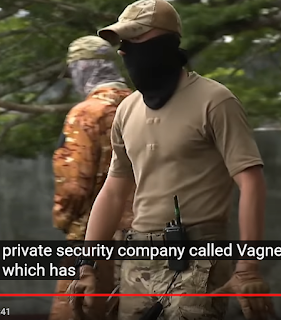Putin’s post-Soviet world remains a work in progress, but Africa already looms
By James M. Dorsey
Russian civilisationalism is proving handy as President Vladimir Putin seeks to expand the imaginary boundaries of his Russian World, whose frontiers are defined by Russian speakers and adherents to Russian culture rather than international law and/or ethnicity.
Mr. Putin's disruptive and expansive nationalist ideology has underpinned his aggressive approach to Ukraine since 2014 with the annexation of Crimea and the stoking of insurgencies in the east of the country. It also underwrites this month's brief intervention in Kazakhstan, even if it was in contrast to Ukraine at the invitation of the Kazakh government.
Mr. Putin’s nationalist push in territories that were once part of the Soviet Union may be par for the course even if it threatens to rupture relations between Russia and the West and potentially spark a war. It helps Russia compensate for the strategic depth it lost with the demise of communism in Europe and the collapse of the Soviet Union.
However, equally alarmingly, Mr. Putin appears to be putting building blocks in place that would justify expanding his Russian World in one form or another beyond the boundaries of the erstwhile Soviet Union.
In doing so, he demonstrates the utility of employing plausibly deniable mercenaries not only for military and geopolitical but also ideological purposes.
Standing first in line is the Central African Republic. A resource-rich but failed state that has seen its share of genocidal violence and is situated far from even the most expansive historical borders of the Russian empire, the republic could eventually qualify to be part of the Russian world, according to Mr. Putin’s linguistic and cultural criteria.
Small units of the Wagner Group, a private military company owned by one of Mr. Putin’s close associates, entered the Centra African Republic once departing French troops handed over to a United Nations peacekeeping force in 2016. Five years later, Wagner has rights to mine the country’s gold and diamond deposits.
Perhaps surprisingly, the Russian mercenary presence persuaded President Faustin-Archange Touadera that the African republic should embrace Russian culture.
As a result, university students have been obliged to follow Russian-language classes starting as undergraduates in their first year until their second year of post-graduate studies. The mandate followed the introduction of Russian in the republic’s secondary school curriculum in 2019.
Mr. Touadera is expected to ask Mr. Putin for Russian-language instructors during a forthcoming visit to Moscow to assist in the rollout.
Neighbouring Mali could be next in line to follow in Mr. Touadera’s footsteps.
Last month, units of the Wagner Group moved into the Sahel nation at the request of a government led by army generals who have engineered two coups in nine months. The generals face African and Western sanctions that could make incorporating what bits of the country they control into the Russian world an attractive proposition.
While it is unlikely that Mr. Putin would want to formally welcome sub-Saharan and Sahel states into his Russian world, it illustrates the pitfalls of a redefinition of internationally recognised borders as civilisational and fluid rather than national, fixed, and legally enshrined.
For now, African states do not fit Mr. Putin's bill of one nation as applied to Ukraine or Belarus. However, using linguistics as a monkey wrench, he could, overtime or whenever convenient, claim them as part of the Russian world based on an acquired language and cultural affinity.
Mr. Putin’s definition of a Russian world further opens the door to a world in which the principle of might is right runs even more rampant with the removal of whatever flimsy guard rails existed.
To accommodate the notion of a Russian world, Russian leaders, going back more than a decade, have redefined Russian civilisation as multi-ethnic rather than ethically Russia.
The Central African Republic’s stress on Russian-language education constitutes the first indication in more than a decade that Mr. Putin and some of his foreign allies may expand the Russian world's civilisational aspects beyond the erstwhile Soviet Union.
Some critics of Mr. Putin's concept of a Russian world note that Western wars allegedly waged out of self-defense and concern for human rights were also about power and geopolitical advantage.
For example, pundit Peter Beinart notes that NATO-led wars in Serbia, Afghanistan, and Libya “also extended American power and smashed Russian allies at the point of a gun.”
The criticism doesn’t weaken the legitimacy of the US and Western rejection of Russian civilisationalism. However, it does undermine the United States' ability to claim the moral high ground.
It further constrains Western efforts to prevent the emergence of a world in which violation rather than the inviolability of national borders become the accepted norm.
If Russian interventionism aims to change borders, US interventionism often sought to change regimes. That is one driver of vastly different perceptions of the US role in the world, including Russian distrust of the post-Soviet NATO drive into Eastern Europe and independent former Soviet states such as Ukraine.
“People with more experience of the dark side of American power—people whose families hail from Guatemala, Chile, Brazil, Haiti, or Mexico, where US guns have sabotaged democracy rather than defended it—might find it easier to understand Russian suspicions. But those Americans tend not to shape US policy towards places like Ukraine,” Mr. Beinart said.
A podcast version of this story is available on Soundcloud, Itunes, Spotify, Stitcher, TuneIn, Spreaker, Pocket Casts, Tumblr, Podbean, Audecibel, Patreon, and Castbox.
Dr. James M. Dorsey is an award-winning
journalist and scholar and a Senior Fellow at the National University of
Singapore’s Middle East Institute.




Comments
Post a Comment